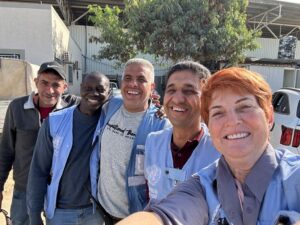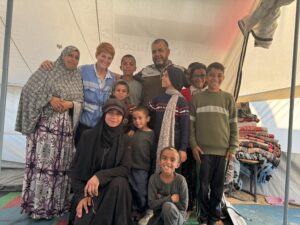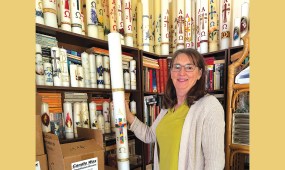SA woman runs lifeline to Gaza
People
Jodie Clark has quite possibly the toughest job in the world. As head of the Rafah border crossing between Egypt and Gaza, she is responsible for getting desperately needed food, medicine, fuel and other supplies to more than 2 million Palestinians.

The South Australian woman and Sacred Heart College old scholar spent 21 years in the Australian Army before working for humanitarian agencies around the world, including Iraq and Afghanistan. But she says the situation in Gaza is “by far” the worst she’s seen and “beyond imaginable”.
“There is no conflict in the modern age that reflects what’s happened in Gaza,” she told The Southern Cross while back in Adelaide on a short break.
Advertisement
“Every school has been flattened, every infrastructure has been flattened, every mosque has been flattened, there are only two hospitals left and they’re severely damaged…when all this is over the kids won’t be able to get back to school because there are no schools, people won’t be able to follow their faith because there are no mosques, there’s no sewerage, there’s no electricity, there’s no water, so even when Israel pulls out, what have they got?”
As more of Gaza is evacuated, Jodie said the people “just keep moving”, setting up tents wherever they can. Many have moved multiple times and have a family member with injuries or a disability.
“Imagine, in the first six months you’ve lost everything, you’ve moved somewhere you don’t normally live, you’ve not taken a shower in six months, you’ve not had electricity for six months, you haven’t had access to medicine or doctors; there are women having their babies in tents, in the sand, in the dirt…children get sick with diarrhea and vomiting and there’s nowhere to clean them off.
“You have a tent for 10 people and 25 people of all ages are living in it and pooping in a plastic bag.”
 Working out of temporary warehouses, Jodie is in charge of all United Nations and non-government organisation (NGO) supplies coming in and out of Rafah, which was the only entry point into Gaza until Israel re-opened the Erez crossing recently.
Working out of temporary warehouses, Jodie is in charge of all United Nations and non-government organisation (NGO) supplies coming in and out of Rafah, which was the only entry point into Gaza until Israel re-opened the Erez crossing recently.
She has at her disposal 150 semi-trailers, 20 forklifts, about 50 Palestinian labourers and “lots of other people who do different things”. Under her care are nearly 1000 Palestinians detained by Israel on suspicion of terrorism and allowed to return to Gaza after being tortured and interrogated.
Jodie said the biggest challenge was the constant looting and violence against truck drivers bringing aid into Gaza.
“Initially when we brought food trucks in they were getting through without too many problems but as the Israelis cleared northern Gaza, more and more people were pushed into Rafah,” she said.
“With 1.5 million people living in Rafah, people who had nothing, they started getting these gangs together to stop the trucks, then it got into a bit of an enterprise and the mafia got involved.”
Advertisement
She said a black market for cigarettes, which sell for $US20 a stick, had compounded the problem.
What upsets her most is it’s Palestinians against Palestinians.
“It’s the unfortunate side of humanity…one of my drivers was knocked unconscious and was in a coma; now he walks and talks like he has had a stroke, he can’t work. And he was bashed by other Palestinians, even though he stopped his truck and said, ‘take it’, they still bashed him.”
Known fondly as ‘Mama Jodie’ by her co-workers, she said one of her first tasks was to set up a kitchen to feed the workers who, like most of the population, were living in tents with no water, electricity or sanitation. By the time she left on her break, 600 people working at the Rafah crossing were being fed each day with the help of an NGO called the World Central Kitchen.
When the Hamas attacks on Israeli settlements occurred on October 7, Jodie was working remotely as a procurement advisor for Australian Government funded projects in Tonga.
Having worked in Gaza for the United Nations Relief and Works Agency (UNRWA) from 2008-2012 and during the conflict in 2014, it wasn’t long before she received an email from an UNRWA colleague saying, “I really need you if you’re available”.
Jodie said as she watched events unfolding in Gaza, she couldn’t believe that the Israelis had let their defenses down, nor could she fathom the viciousness of the Hamas attacks.
“I was dumbfounded…their whole mental thinking and prowess is about securing their country so for them to have been caught short, I just found it really impossible to believe.
“But then as more news of the attacks came out, I was shocked at the way the Hamas militants had acted…the violence inflicted on innocent people, including women and children. That’s not the Palestinians as I know them.
“This is where we have to be very clear with people,” she insisted.
“Hamas is the name of the government, we have Labor and Liberal, they have Fatah in West Bank and Hamas in Gaza. Hamas were elected originally but now if anyone who objects to them or tries to stand up to them and start a new party, something happens to them so no one has the strength to stand up to them.”
Jodie said militants who attacked the Israeli settlements were “specially trained and specially indoctrinated” but there were also rumours that many had been drugged beforehand.
“It’s really, really out of character,” she said.
“You just have to look at history; all the times that Palestinians have been attacked, or put in a position where they should retaliate, have they ever taken up weapons against anybody?
“Even in the West Bank, they throw stones, that’s it, there’s no booby traps, no IEDs (Improvised Explosive Devices).
“It makes no sense to me whatsoever. Because basically they’re not fundamentalists, they’re pacifists generally and they’re really caring people, even now with what they’ve gone through, they still don’t take up arms against Israelis, not the general population at least.”

Jodie with some of her UNRWA workers.
Jodie said the Palestinian police officers escorting food convoys were “just like any other police force such as the SA Police who work for whatever government is in power”. And yet they were targeted by the IDF on the basis they are Hamas militants.
“I worked with those police officers day in and day out and they’d say ‘Jodie, I just want to be a police officer, I just want to help people’.”
Tragically, five of those police officers were killed in a rocket attack less than half an hour after she’d been with them while they were trying to stop looting. She had returned to the depot to sort out an issue and when she heard the blast, she knew at once what had happened.
“It was heart wrenching,” she said.
“I had to go back and identify the remains before they were taken away.”
Under Islam, a Muslim must be buried the same day they die, and when it isn’t possible to contact families within 24 hours, the dead are interred without the family present. “There are mass graves everywhere,” she said, adding that fortunately the police officers were returned to their families.
Another difficult part of her job is allocating ambulances to people in need of medical assistance. With only 20 people able to be transported outside Gaza each day, from a list of about 1000, she said it was devastating to have to turn people away.
“One young lad came in crying, wanting medicine for his father, I managed to get it for him but his father deteriorated and needed to be evacuated,” she recalled.
“Then he brought his father to me, they carried him in a chair, he was stick thin and bright yellow, I don’t know how he was still alive.”
She told the boy “you didn’t have to bring him to me to prove to me how sick he was” before explaining that she couldn’t help.
“He died about a week later, this is the desperation of people,” she said.
“It’s one of the downsides of being the boss of the Rafah crossing because everyone thinks you can help.”
Asked how she stays positive, Jodie said “you just concentrate on what you need to do”.
“I’m not there in a political position, I’m there to do logistics, I work with whoever I need to work with in a respectful manner, I respect what they have to do on their side, whether it be Egypt, Israel or Jordan,” she said.
“I treat my drivers and my labourers exactly the same as I treat the managers; everybody is a human being; everybody has a role to play to make the outcomes successful.
“It’s hard when you’ve got Palestinians attacking your trucks when you’re bringing food in for them, and attacking me personally, that can be really tough but I just focus on the job, and I surround myself with people who are amazing.”
Jodie said an example of these “amazing people” was a 17-year-old boy she couldn’t employ because of his age but who came in every day as a volunteer.
“He was just the loveliest lad, he wanted to make tea, run around and do this and that. Out of everybody he’s the one who still contacts me and says ‘there’s no life in Gaza without Jodie’,” she said.
“In the morning you might be being attacked and in the afternoon you’re having a joke, messing around or whatever, you just do the best you can.”
Her friendship with her co-workers is obvious. “They say things to me like ‘you’re the air that keeps me alive’ and ‘you’re the light that brightens our day’ – these are logistics guys, where do they get these sayings from?”
“They respect me because they know I’m tough, but if something happened to me they would come to my defence.”
Jodie describes herself as a survivor, having come from “humble beginnings” in Broken Hill. She grew up in Broken Hill before moving with her mum and brother to Adelaide where she attended Marymount and Sacred Heart colleges.
More interested in sport than academic life, she left school midway through Year 12 in 1981 to join the army and had an outstanding 21-year military career, including receiving the Conspicuous Service Medal for active service in Cambodia.
After retiring from the army she joined the United Nations and was deployed to Iraq working with the World Food Program in Basra in 2003. She has worked for Oxfam in Afghanistan where she provided security for an underground school for girls, in Indonesia after the tsunami, as well as Sudan, Jordan, Syria and Pakistan.
She completed her Masters degree in Logistics/Supply Chain Management at the age of 51.
Laughing as she recalled she once wanted six children, before her marriage of seven years ended, she said “I think life is mapped out for you in some ways, you just don’t always know what it is”.
In Rafah, Jodie lives with 10 other international workers in a villa which is heavily guarded but she often gets up in the middle of the night to wake them up and she now has a small dog she rescued to help her by barking at the guards.

Jodie with a family she helped after a truck accidentally ran over their eight-year-old daughter. When she first met the family she found them living under a piece of shade cloth. There were 11 children and they had one mattress and two blankets, the mother was partially blind and the father had a serious leg injury from a bombing. “It was the most deplorable scene I have ever walked into and they all stood around me expecting miracles,” Jodie said. “I was extremely overwhelmed and had to go out and catch my breath.” Over the months Jodie took the family a tent, mattresses and other necessities as well as a wheelchair for the child and walking sticks for the mother and father.
While the nearby rocket blasts force the doors of the villa to bounce open and windows to shake, she said it’s the constant sound of drones or ‘quad copters’ that “does your head in”.
“After a while you get used to it, but then when you don’t hear it, when it stops, that’s when you notice.”
A big advantage in her job is knowing the local culture and the way mukhtars, or mayors, represent family groups, particularly when it comes to negotiating with a driver who might have accidentally run someone over.
“I knew that system, it’s really hard to work in Gaza if you haven’t worked there before,” she said.
“I also had a relationship with the Israelis who run the borders because I’d been there before, I understood the dynamics.”
Jodie said Gaza is “1000 times different” since she was there a decade ago.
“I cannot comprehend what the Israelis have gone through since October 7, the impact on their community and their society of that type of attack on innocent people. It’s different when the army is attacking another army, another government, but not innocent people, babies, children, the pain and the suffering and all the hostages that are still in Gaza,” she said.
“These people were just living a peaceful life, to throw grenades into the safe rooms where people were hiding, why? And the woman who was in her 80s who they put on a motorbike and took back into Gaza, why were they targeting those sort of people, why that group of people, the vulnerable?”
Similarly, as she watches the “catastrophe” in Gaza unfolding, she questions why Israel won’t stop.
Related Story
Insights into complex conflict
“Now they’re targeting the people, they’re doing exactly same as Hamas did to them.”
Her workers have shown her photos of their homes and cities, with cafes, shopping malls and car yards, before the Israelis destroyed them. They spoke of the “beautiful life” they had.
“It wasn’t a boiling pot of oppression, people were still being allowed to go in and out, not everyone, but people were being educated, there were lots of universities, access to medicine, food, basic necessities, now they have nothing.”











